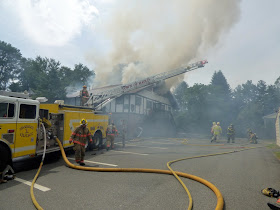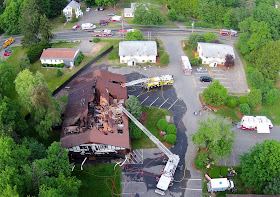Smoke could be seen from a long way off
Smoke and fire billowed from the roof
Engine 2, the quint, was quickly on scene
Firefighters from Hadley, Pelham, Northampton, South Hadley, Belchertown and South County Ambulance joined every available member of AFD including the Call Force to go toe to toe with a stubborn fire that wreaked havoc on an 8 unit apartment building, but fortunately not finding human flesh to consume.
West side where fire originated
Although at least one firefighter was treated for heat exhaustion due to hot muggy weather, and performing strenuous activity in heavy turn out gear.
Turnout gear is especially hot on a day like today
Hot, demanding, dangerous work
The fire apparently started around 1:30 PM at the far western end of the building but managed to make it all the way to the far east end via the attic, the Achilles heel of circa mid-1970s or 1980s construction.
AFD E2 left Hadley Ladder right
Amherst Engine 2, an aerial which can throw up to 1,000 gallons per minute from the top of her 75 foot ladder and Hadley's Ladder Truck with slightly better capabilities took up positions at each end of the building and unleashed water as though it were Niagara Falls.
But The Beast was having none of that and continued to consume the wooden two story building at a ravenous rate.
The opposite end of the building from where the fire first started
After just over four hours of pitched battle, by 6:00 PM, The Beast was put down.












Larry, this is at least the third serious fire in a shared attic. Without getting into a p***ing match with the AFD, wouldn't a single heat detector have tripped in time to have been a great help? And even if all it did was trip a very loud bell with a sign reading "dial 911 if ringing" -- not a state-of-the-art system but something this cheap/basic/primitive -- wouldn't it have helped?
ReplyDeleteSo why isn't SOMETHING required in the attics?
Attics generally hold a lot of heat- I would think a heat detector would be sounding a lot due to the humidity + temp that generates in an attic. Good thought though.
ReplyDeleteBrave men and women!
ReplyDeleteED YOU ARE A JACK OF ALL TRADES...IS THERE ANYTHING YOU DO NOT KNOW......MAYBE YOU MIGHT BE OF USE TOP YOUR HOME TOWN OR IS THERE PARANOIA THERE LIKE HERE...
ReplyDeleteWell 12:11, I do know three things:
ReplyDeleteA: There are heat detectors that trip on "rapid rise" -- not that the attic is hot but that the temp is rapidly increasing by something like 10 degrees(?) per minute -- or more -- something that only a working fire could possibly produce enough heat to do. Hence, say, 10 degrees to 70 degrees (Rolling Green) or 110 degrees to 170 degrees (here) is a rapid 60 degree increase that requires the same number of BTUs/Calories to accomplish, and if it occurs inside of 2-3 minutes, the only thing able to produce that much heat is some sort of fire.
B: Hot water is supposed to br 110-130, it boils at 212, paper catches fire somewhere around 451 degrees (remember the book?). Yes, I have seen heat detectors as low as 120, which a hot attic would trip, but they come higher -- and do not forget that asphalt melts and if that attic has no ventilation, the heat will destroy the roof treatments. Likewise, if it got hot enough up there, it not only melt the insulation off the wiring (starting a fire, but kill any one who went up there (superheated air), and I believe both occur well below the kindling temp of wood.
Attics may be hot, but they aren't THAT hot...
C: You are an A-hole.
At least 2:11 isn't a know it all A-hole like Ed.
ReplyDeleteHear, Hear, 2:11.
North Village: overheated bathroom fan witnessed by tenant who just happened to look up & saw flames. Fire in 4 unit shared attic, 2 units badly damaged.
ReplyDeleteRolling Green: fire spreading through shared attic of 6-unit block.
Alpine Commons: fire spreading through shared attic of 8 unit building.
Three major fires where a small fire was given a chance to become a major multi-unit fire because of a shared attic without any form of electronic detection/alarm system.
Two of these fires involving AFD having to do a high-risk search for occupants.
What is it going to take to get some sort of detection/alarm system up in these shared (wooden) attics? A dead firefighter (or cop)?
And Enku, if you are going to claim authority over UMass students off-campus, how about assuming some responsibility for them? How long do you think it would take for an alarm system to be installed in these shared attics if UMass said that students couldn't live in the buildings without one?
Ohh Fire Marshall Ed is at it again....
ReplyDeleteWhatever. If it was someone other than UMass students dying in these fires -- and every fire fatality in the past quarter century has been a UM student -- someone would be doing something about this.
ReplyDeleteEd,
ReplyDeleteYou are absolutely correct in saying that rapid detection is crucial in limiting the severity of fires. You are also correct in your assertion that heat detectors operate using "rate of rise" as their triggering mechanism. In order to activate the detector must see rise a certain number of degrees over a certain time period. The issue is that state fire codes specify certain devices for different types of occupancies. Over time these codes are upgraded, however the regulations generally do not require older building to meet the newer codes. Only when these older buildings are renovated can AFD require the owners to comply with the current fire codes. So as you can see that in most cases the town has no control over detection devices in older buildings. They do however have control over the staffing level of the staffing level at the fire department.
Jeff Parr
What I don't understand is that if Amherst is able to (a) define who is permitted to live in a unit on the basis of ancestry/marriage (i.e. the 4-unrelated person limit), (b) requite existing rental apartments to participate in a rental registry, and even (c) require them to pave parking areas & such -- if the town has the power to pass bylaws on all of that (for existing buildings) then why doesn't the town have the power to mandate attic heat detectors?
ReplyDeleteNot as fire code enforcement but as a condition for rental licensure.
In other words, while the town can't make a building owner install an alarm system, the town won't permit him to rent it to anyone unless he/she/it does.
Likewise if UMass has the power to regulate student off-campus behavior, allegedly for the student's own benefit, why can't UMass require (anything UM wants to) in the shared attics? Why not require landlords asking Enku to release a prospective tenants judicial file to submit documentation of an attic alarm system?
After all, not being able to rent to UM students would make a lot of these units unrentable...
"Only when these older buildings are renovated can AFD require the owners to comply with the current fire codes."
ReplyDeleteWhat about "change of use"?
Lincoln Apartment Buildings 2, 7, 9, & 11 (a total of 16 2nd story apts) only have one stairway to the ground (in one case a stairway narrowed to 32") -- they have 2 external doors, right next to each other, both exiting from the same room.
Buildings 1, 3, 4, 5, 6, 8, & 10 only have one exit from the apt -- only one door out for all upper floor units -- 35 2nd story units and 5 third story units in Bld 5 that has the brook behind it. Ladder truck access to the rear would be difficult at best...)
OK, it met code in 1958 for rental apartments -- fire escapes weren't required then -- nor much else as there wasn't a state building code. Even though almost all of the units were completely renovated in the 1990's-00's, apparently fire escapes still weren't required for existing apartments.
But UMass has now converted the whole thing into a dormitory, licensing beds in a collective 11-building complex rather than renting individual apartments qua apartments. Still R-2, but a different/changed use?
Why didn't that trip the requirement for the second means of egress (i.e. fire escape)?
Larry - Thank you for covering this and the incredible images! I deeply respect your care and support of our local AFD and APD!
ReplyDelete